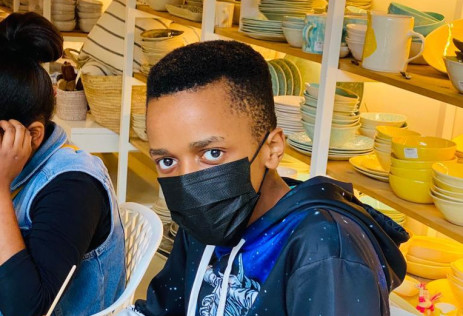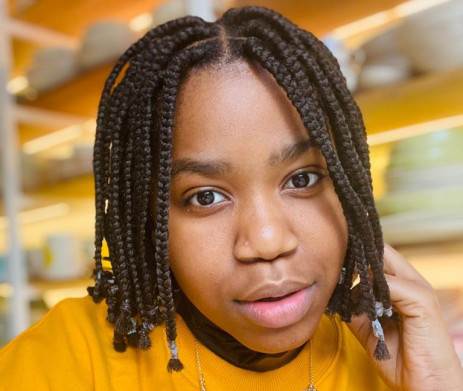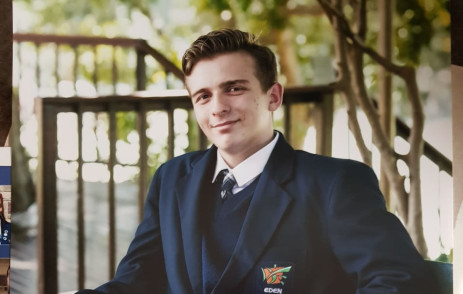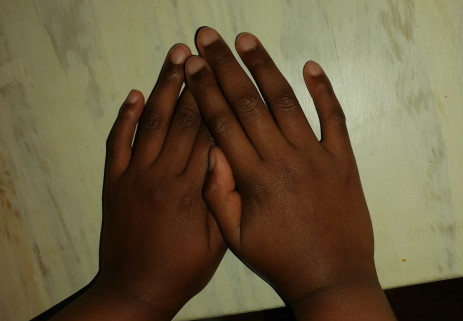Children are growing impatient with adults’ complacency with racism
Apart from social media, most adults and children seem to shy away from talking about racism, even if they have strong feelings about it.
Dineo Mthiyane. Picture: Supplied
The year I turned 10, my parents moved me to a predominantly white school. The white children mocked the food I ate, my accent, how my school accessories were different from theirs because mine were cheaper, and that I had thick, wiry hair on my head and legs. I had to grow up quickly to keep my confidence.
Most adults will tell you that “children these days have it easy”. Almost every generation has been doomed to hear this from their elders. But speaking to just a few teenagers and children myself, it seems it isn’t true. In fact, it’s a lot more difficult for them to accept the extent of the outdated generalisations that would be frowned upon even in slapstick comedy films.
“One day, I was walking through the mall, and I went down to tie my shoelaces. There was a white lady. She flinched and grabbed her bag away and gave me a look until I went away,” 17-year-old Nkosi Sibindi explained to me this week.
Nkosi lives in Umbilo, KwaZulu-Natal. At his delicate age, he is telling a story I’ve heard countless times before from people much older than me.
Nkosi echoes this. “It was shocking because you would think in our day and age, racism would be something that’s foreign, that we wouldn’t experience ourselves. It didn’t make sense that people in our day and age are still behaving like this. It was shocking and it made me feel very bad.”
But in contrast to how I remember my elders telling me similar stories, Nkosi didn’t shrink away and made sure to finish tying his shoes first before continuing on his errand.
While social media is rife with people fighting about race and racism, in real life, many children and adults are uncomfortable to bring it up in conversation and deal with it in the open.
Sibahle Nkehli is a 17-year-old from Musgrave who works with the Durban Youth Council. She focuses on a number of community drives and projects, including education campaigns on topics such as environmentalism and collection drives for poor people.
“We serve the community, but we also educate each other. We have talks about xenophobia and we raised money for an organisation that helps refugees,” Sibahle explained.
But they have never talked about race.
“We haven’t had a talk about racism, actually,” Sibahle laughs. “And it’s a problem because that seems to just bypass us. It’s like people don’t want to talk about it.”
Siblings Dineo (17) and Simphiwe (15) Mthiyane from Newlands West, KwaZulu-Natal, are not afraid of opening up on the topic. Together, they assist their uncle, Wandile Mthiyane, with his pop-up project the Anti-Racist Hotdog movement. It was started after Uncle Mthiyane and a friend had to deal with a racist response from the Durban Under Sea Club, also called the Point Watersports Club. With this initiative, they are trying to speak openly about racism.
Here, the brother and sister duo work on selling hotdogs at different places and talking to people about their experiences with racism and viewpoints on race in general. The experience is rewarding for them.

Simphiwe Mthiyane. Picture: Supplied
“I feel good, feeling like I tried to make a difference. We are trying to make a difference. It’s not just about selling hotdogs; it’s about bringing people together and seeing their perspective on racism,” Simphiwe said.
Dineo has plans to take the event to a larger audience one day because it helps her access people of different races and understand them.
“I don’t only make friends from my race group. I get to know how they feel about racism. Then I know how a white person, Indian person or coloured person feels about racism.”

Dineo Mthiyane. Picture: Supplied
Children have different understandings of what racism is. Some see a clear distinction between discrimination and racism. But it isn’t so black and white for others.
Jordan Totham (18) from Berea, KwaZulu-Natal, said he hasn’t experienced racism himself, but said racism can be extended to white people too.
“People say there’s white supremacy. So, people say ‘they don’t know what they have. They are people who have everything.’ Sometimes I feel like that’s not true because there are some of us white people struggling to get by. Sometimes they don’t understand the full story based on what they think, not what they know.”

Jordan Totham Picture: Supplied
Ruby Healing, a 17-year-old from Bedfordview, Gauteng, sees it differently. Ruby said she had never been a victim of racism because she’s white.
“White people cannot be discriminated against because there is no history of racial oppression. If I’ve been discriminated against, it’s been due to my gender, sexuality, or religious presentation. But never my race.”
WHAT IS RACISM?
Racism is when you discriminate against people of another race or colour, anyone who is not you, who is different from you. Everyone can experience racism.
Nkosi, 17
It’s how we treat another race group. It can be a black person against a white person too.
Dineo, 17
How we treat people unfairly based on their skin colour and where they come from, like their country.
Simphiwe, 15
Racism is when peach people are being mean to you because of the colour of your skin and it doesn’t make sense at all.
Zaphin, 9
Racism is a systemic issue because it’s a system that continuously oppresses people who are not of the white race, and includes the education system and the prison system, to make sure other people stay at the bottom no matter what. Discrimination is more upfront and social, like not getting a job because you are black. Racism is a lot deeper, it’s systemic.
Sibhle, 17
Racism is a type of discrimination based on the colour of their skin, and treating people differently based on the laungauge they speak.
Jordan, 18
Racism is a lot to do with a power imbalance due to a huge issue of oppression. It’s more based in colonisers’ superiority based on pseudoscience, greed, superiority.
Ruby, 17

Ruby Healing. Picture: Supplied
Meanwhile, in Cape Town, nine-year-old Zaphin sat in her bed just before sleeping time and explained over the phone that the concept of race wasn’t rational. Zaphin’s real name has been withheld after a request from her parent.
“Race is the different skin tones of different people. You know how our palm is very light and it’s peach, while the back of our hand is completely brown? It’s kind of like the colour of your hand is the colour of some peach people, but for some reason it’s called white. And when you have brown skin, for some reason, I don’t know why as well, it’s called being black. There’s coloured and Indian people as well,” she explained. “Racism is when peach people are being mean to you because of the colour of your skin and it doesn’t make sense at all … On the inside we have the exact same everything.”
Zaphin once told her mother that she wanted “to be peach and have straight hair”, and her mother spoke to her about race and racism. “And then mummy taught me how to love myself and love the colour of my skin.”

Zaphin; Picture: Supplied
HOW TO DEAL WITH RACISM
What we learn from our parents has a big impact on what we understand about society. But as diversity trainer and curriculum developer Asanda Ngoasheng explained, children are more likely to challenge their conservative parents if they know more. She says people who think critical race theory brainwashes children couldn’t be more wrong.
“Even the kids who hold the most shocking views very quickly are able to see the wrong in what they say when you explain it to them in child-appropriate language. People get scared and say ‘why are you teaching my children this’, but children already know. They see these things and they observe diversity,” Ngoasheng explained.
She works with children in schools such as the prestigious Roedean School in Johannesburg to help them articulate and process race and racism.
“Sometimes home is good, but society is bad. You think about a South African child who sees a nanny and people in service who are all black and they internalise the idea that black people are for service. When I challenge that socialisation as we work through the curriculum I find that children are malleable and they are willing to challenge their parents on these issues.”
Schools are important for children to understand what race and racism is about. Within the last six years, students from Rhodes University in Grahamstown and others called for a decolonisation curriculum. In 2019, Basic Education Minister Angie Motshekga called for a decolonised education system. But it is still met with resistance from the public. In April 2019, the department released an evaluation report looking at the current textbooks in the school system in preparation for additions of setworks that promote diversity. Nothing has come from it.
“Looking at what I had to learn in the textbooks, it’s concerning that children still have to learn that way. Like racism – what’s in the books is not what racism is. So, the government needs to deal with those school books,” Dineo said.
Some children see structural policy changes put in place since 1994 as insufficient in dealing with the forms of racism they face.
“People think stuff like BEE and getting the land back are the only steps we should take to eradicating racism. Those problems aren’t eradicating racism, it’s trying to reverse the bad effects of racism. Government should start focusing on trying to fix racism within schools. Teaching more about inclusion at school and getting it out there into families.”
Ruby, on the other hand, says adults need to step up and learn so that they can teach younger children. “I was watching a YouTube video and they said, ‘in the age of information, ignorance is a choice’. If you don’t understand something, google it,” she said, quoting a United Nations statistic that more people have a phone than they do a toilet in their house.
“Worldwide, it’s not being dealt with properly. Black Lives Matter was a huge thing because it was black. But if it was a white person victimised, it would not be so big. The way it is being portrayed and dealt with is not the right way. People should sit down and talk about it,” said Dineo.
When I asked Zaphin what she thought adults could do better to work against racism, she didn’t let me finish my question: “Stop doing it at all.”
Two decades after I was in school, children are still hitting reality hard and fast. This time, however, there are some parents who are managing to kiss the wounds better.
Download the Eyewitness News app to your iOS or Android device.
For all the latest lifestyle News Click Here

